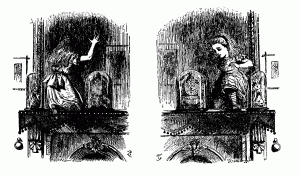University of Lisbon Centre for English Studies (ULICES)
November 26-29, 2014
Deadline: May 16, 2014
“The Victorian Household: Power, Policies, and Practices”
The Victorian household has been celebrated as a unique
platform for the assertion of the British middle class and its values, as well
as of both private and public politics. Within its sphere, gender, class,
economic and political issues intersected as the household provided the
background for social practices ranging from the kitchen to the parlor, from
the street to the Houses of Parliament. Furthermore, those practices encouraged
reading, intersected in various ways with the British Empire and all in all
formed the backbone of Victorian culture.
The most recent approaches to the various themes encompassed
by the Victorian Era – which may even include the challenge to the concept
itself and its traditional time frame – have underlined a trend that points
towards a current rereading and a contemporary appropriation of the very
dynamic output of that period. Often controversial, but always productive,
these approaches stress the interdisciplinary potential for interpretation of
the characteristics of the age and often underline the strands of radical
thought which encouraged aspirations for upward social mobility. Thoughts on
“betterment” or “self-help” were expressed not only in politics, religion,
literature and philosophy, but also in innovative esthetics and were
accompanied by the action of new unheard voices, in this period of deep
cultural change. These approaches also stress the belief that 21st century attitudes
are more indebted to Victorian efforts and achievements, not least its concern
about human nature and Humanity, than may be commonly perceived. Furthermore,
the echo of the period’s fashions, its modes of exhibition, the emergence of
museums and libraries, and the practices of collecting constitute further
fields of knowledge and interpretation worth looking at with 21st century
eyes.
We welcome the proposal of 300 word abstracts, for 20 minute
long papers, on topics and themes of interest including, but are not restricted
to, the following (proposals should refer the panel participants wish to be
included in):
1. The Victorian household. The home
- Who holds the power in the household? Gender roles and
issues and the Victorian family;
- How to govern the home. Economy, sustainability, social
concern and the challenge to overcome poverty;
- Unheard voices in the home. Children and the subaltern;
- Fashion, style, art and interior decoration;
- The city: urban development, social practice, utopian
visions.
2. Culture
- Libraries, paper and book circulation, the publication of
popular fiction and anthologies;
- Practices of collecting / practices of reading and the
emergence of art galleries and museums;
- The Victorian era in literature, cinema and the arts: people,
ideas and things;
- The power of science: social Darwinism and eugenics;
- Victorian values and morality;
- Contemporary representations and appropriations of new
Britain;
- Victorians at home and abroad.
3. Politics
- Marriage, divorce and the regulation of child paternal
power. Legislative production during the Victorian Era;
- Legislation and education;
- Ideology(ies) and party politics: individualism and
collectivism;
- Perspectives on Empire and imperial expansion;
- Democracy and parliamentary reform.
The conference will also comprise a social and cultural
program, which will be announced in the conference website in due time. The
Organizing Committee expects to publish the essays delivered at the conference
in a peer-reviewed international publication.
Fees: 100 euros; (early birds: 80 euros if registration is
completed until 16 May); students (50 euros).




















